'Women's achievements and experience have left a deep impression on the historic environment. Once exposed, this can help fill in the gaps left by previous generations' recording of history to reveal a host of fascinating and inspirational stories.'
One of my heroines is Matilda who fought with her cousin for the throne of England, she was more than capable of being an effective ruler, but her downfall was simply the fact that she acted like a king, and as Helen Castor in her book writes
'Haughty' and 'intolerably proud' these are the adjectives associated with her name, phrases coined in those few months of her life when she tried to exercise power as a monarch in her own right'
This was not what men thought a woman should be, it was unwomanly behaviour, but they were the qualities expected of a king.
and with him took up arms against the weak rule of her husband Edward II. There's Boudicca, Catherine of Aragon (another
of my favourites) Anne Boleyn, Queen Elizabeth, Florence Nightingale, Marie Stopes they are all icons because their story stands out. But what of the women of the Wars of the Roses, left behind to manage great estates and left vulnerable to the attack of marauding armies, the 'everyday' women, those who were not monarchs or achievers of the daring do or pioneering scientists.
Women in the past have been placed in all sorts of different categories, the pious lady, the nun, the wench and the scold. Women in literature and art are often depicted as a virgin or a whore, even this is not correct, prostitutes were more widely accepted in medieval times and nuns weren't always as saintly as we are led to believe, and as mentioned before, living quietly among them are other strong women, the ones the world knows little about. One fine example of a capable early medieval woman was my very own ancestor Margery, a descendant and kinswoman of the mighty Norman lords, the Earls of Surrey. Margery saw very early on in her marriage that all the lands held by her husband's family were gained purely by right of marriage, the vast lands of her mother-in-law and sister-in-law had been thrown into a large melting pot. Margery had no intention of this happening to her ancestral lands or her property! Margery's son was under age on the death of her husband and she feared, quite rightly, that the boy would become a ward of his paternal uncles and the lands that were hers by right would soon be managed, and finally taken by her in-laws. So angry at the thought of this she disinherited her own son rather than see her lands end up as part of the vast estates of her dead husband's family. In a very unusual move for the time she gifted her lands to a woman, who at present, seems unrelated. What Margery foresaw, turned out to be quite right, nearly all the lands owned by her husband's families descendants, for nearly four centuries, were gained by marriages to wealthy heiresses.
suggesting that the debt be settled in refunds on export duties. There is German-born astronomer, Caroline Herschel, who discovered several comets, one of which is named after her. Then there is Lavinia Fontana a commissioned artist, who painted anything from portraits to female nudes to religious art, a confident woman who didn't work within the confines of what society saw as befitting her rank, free to paint and live her life as she pleased.
ones who worked in the fields and the ones who worked in the factories, and once the war was over and they were no longer needed, their jobs given to the returning men. The women of Bletchley signed the official secrets act and therefore were unable to tell anyone what they did during that time. This led to them being frustrated, angry and bored with their present lives and left them wanting more, but they were living with men who expected them to be happy with the role of wife and mother and didn't understand that for many it wasn't enough.
have seen some women cut through these ties. Girls today may have none of these things but it was said to me recently that society has 'subtle and complex ways that disadvantage and discriminate against women” and this is no surprise. I am concerned for young women when they are humiliated and harassed. I worry how they cope when all they hear is that they
are lesser beings and then I’m irritated when I see scantly clad young ladies standing in front of Formula 1 cars or parading themselves in front of darts champions. I am never quite sure whether these young women do it because they want to and are therefore empowered and confident or do it because that’s what they feel men want to see. Girls are continually bombarded
with impossible physical standards that dictate the right weight, the right shape and the right clothes to wear, leaving them to struggle with insecurities and low self-confidence. Today, women have a different sort of pressure than those of their ancestors, but it is pressure non the less. Twenty-first century women are criticised about the choices they make whether it is a career or whether it be motherhood and this can make many women's lives an unhappy one, women of the past knew what was expected of them and these restrictions made many of their lives an unhappy one too.
We've not moved on too much, have we?
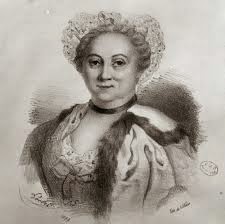
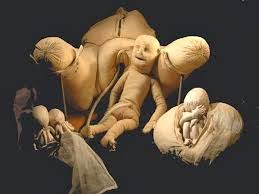
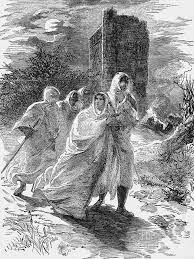
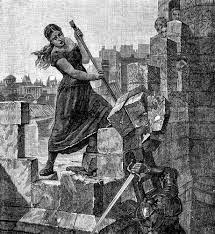
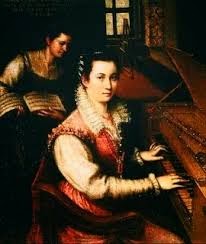
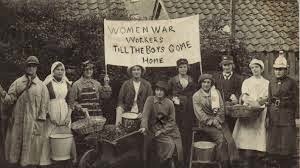

 RSS Feed
RSS Feed
